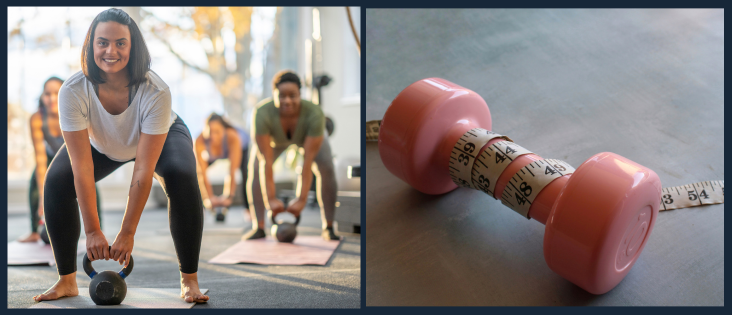When you think about building muscle, you might think of professional athletes, gym rats, or bodybuilders. However, nothing could be further from the truth. Maintaining a healthy amount of muscle is crucial for us all, regardless of age, gender, or fitness level.
Building muscle: 8 Evidence-Based Benefits
Having strong, flexible muscles enable us to support our joints and bones which will weaken as we age (yes, it sucks, but it’s the truth!). In fact, as we age, having muscular support is more important than ever.
From reducing the risk of chronic diseases and improving movement to boosting cognitive function and self-confidence, investing in your muscular health is one of the best ways to spend your time and effort! Today, we are exploring why it’s beneficial to focus on building muscle in our bodies, and that it’s not all about aesthetics.
1. Muscle Tissue Can Strengthen Bones and Reduce the Risk of Osteoporosis
Most of us are lucky enough to be born and grow into strong, healthy bones. However, as we age, our bone density decreases, increasing the risk of osteoporosis and fractures, and our joints could use a little extra help. Strength and resistance training can stimulate our bones to be stronger and denser, reducing the risk of joint problems. In addition, joints that are weakening need crucial support to function efficiently, and by building muscles, we’ll give them the help that they need.

2. The Effect of Muscles on Insulin Sensitivity and Glucose Levels
When you consume carbohydrates, your body uses it for fuel and releases insulin to help regulate blood sugar levels. In some of us, the body can become resistant to insulin, leading to elevated blood sugar levels and increasing your risk of type-2 diabetes.
By putting on more muscle, you’ll be increasing the number of glucose transporters into your muscle cells, allowing the glucose to be more efficiently absorbed into your bloodstream and then used as fuel by the muscles. This increases insulin sensitivity, which in turn, can help reduce the risk of type-2 diabetes and support your overall metabolic health.
3. Muscles Can Improve Cardiovascular Health and Reduce Risk of Diseases
Contrary to popular opinion, building muscle isn’t just about looking good; it also has significant benefits for cardiovascular health. Strength and resistance training has been shown to lower blood pressure, improve cholesterol levels, and reduce the risk of heart disease and stroke.
When you engage in muscle building, your heart has to work harder to pump oxygen and blood to the working muscles. Over time, this strengthens the heart muscle, making it more efficient at pumping blood throughout the body. A healthier heart also can lower LDL (bad) cholesterol levels and increase the HDL (good) cholesterol levels, two types of lipoproteins that play key roles in cardiovascular health.
4. The Effect of Muscles on Metabolism and Weight
One of the commonly-known benefits of muscles is their impact on metabolism. Muscle tissue is metabolically active, which means it requires energy to maintain and grow. We get energy from calories, so those muscles are in fact, consuming that energy! Even when resting, your body continues to burn calories to maintain and grow those muscles, and your metabolic rate will increase to maintain a healthy weight. If your caloric spend is more than your caloric input, your body will then turn to excess fat for fuel.
Building muscle using heavy weights is often associated with bodybuilders and gym rats looking to sculpt their body, to a specific ideal. That doesn’t sit well with many women, who might be hesitant to end up looking like the Michelin Man after a few weeks. Luckily, that’s a non-issue, as one doesn’t “mistakenly” fall into the body of Arnold Schwarzenegger overnight! Lifting weights is only one way to build muscle. You can also use resistance bands or calisthenics to build functional strength.
Related: Intermittent Fasting: A Helpful Guide To The Essentials

5. Muscles Enhance Functional Fitness and Reduce the Risk of Falls
As we age, maintaining muscle strength becomes increasingly important for preserving independence and reducing the risk of falls and injuries. Sarcopenia, the age-related loss of muscle mass and strength, can lead to decreased mobility, balance issues, and an increased risk of falls. Strength training has been shown to be an effective way to combat sarcopenia and maintain functional strength as we age.
By engaging in regular strength training, older adults can improve muscle strength, balance, and overall physical function, reducing the risk of falls and injuries. Incorporating resistance training into your routine, regardless of age, can help maintain functional strength and independence, allowing you to continue enjoying an active lifestyle well into your golden years.
6. Muscle Tissue Enhances Athletic Performance and Recovery
While building muscle is important for overall health, it’s also crucial for athletes looking to improve their performance and recovery. Resistance training has been shown to enhance power, strength, and speed, which can give athletes a competitive edge in their respective sports. Additionally, building muscle can help protect against injuries by strengthening the muscles, tendons, and ligaments. This is particularly important for athletes who engage in high-impact or contact sports, where the risk of injury is higher.
7. Muscles Can Enhance Cognitive Function and Brain Health
You might be surprised to know that building muscles not only improves your overall physical wellness but can also have a direct impact on your mental health! One recent study found that strength training can increase the production of growth factors in the brain such as brain-derived neurotrophic factor (BDNF). It promotes the growth and survival of brain cells, enhancing cognitive function and potentially reducing the risk of age-related cognitive decline.
In addition, resistance training has been linked to improved mood and reduced symptoms of depression. By engaging in regular strength training, you can support brain health, enhance cognitive function, and potentially improve mental well-being.
8. Building Muscle Can Boost Self-Confidence
Okay, so while most of the benefits are internal, there’s also the external! For most people, muscles are also a way to look good, and with that comes feeling good. The psychological benefits of looking and feeling good cannot be discounted. When you see the results of your hard work at the gym or, at home, it can lead to a greater sense of accomplishment and pride in your physical abilities. This boost in self-confidence can translate to other areas of your life, such as work, relationships, and overall well-being.

Additionally, strength training can help improve body image by promoting a positive relationship with your body. As you build muscle and see your body transform, you may feel more comfortable and confident in your own skin, regardless of your age, gender, or body type. By doing some light training, you can not only improve your physical health but also boost your mental well-being and self-confidence!
Final Thoughts
Building muscles isn’t only for gym rats and primo athletes, but it is an essential component for normal people of all ages, genders, and fitness levels. The science is clear that investing some time into taking care of your muscular health has numerous benefits on metabolism, cardiovascular health, cognitive function, and psychological well-being.
Try to remember that building muscle and overall fitness isn’t merely about the destination, but rather, the journey. Consistency is key, therefore, start small, but do it CONSTANTLY, then gradually increase the frequency and intensity over time if necessary. With some dedication and discipline, you’ll be well on your way to enjoying a healthier life filled with vitality, regardless of age. So, keep building muscle, and all the best on your fitness journey!








2 Comments